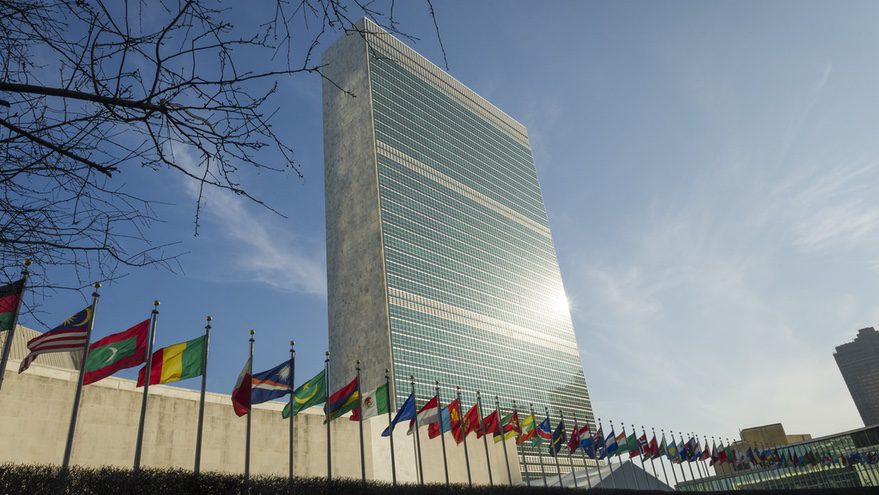WASHINGTON — Russia, as expected, voted against an April 24 United Nations Security Council resolution designed in response to reports about the country developing a nuclear anti-satellite weapon.
Russia was the only one to reject the draft resolution that reiterated rules in the Outer Space Treaty against placing nuclear weapons or other weapons of mass destruction in space. Thirteen other members of the Security Council supported the resolution, while China abstained. But as a permanent Security Council member, Russia's vote acted as a veto, preventing the resolution from being adopted.
Japan and the United States put forward the Security Council resolution, which they described as the first one focused on outer space matters. The resolution instructed members to adhere to Article 4 of the Outer Space Treaty, which prohibits countries from putting nuclear weapons in orbit or on celestial bodies. It also urged countries not to develop nuclear weapons or other weapons of mass destruction specifically meant for orbit.
The decision to propose the resolution, which had 63 other nations as co-sponsors, came after reports in February about the U.S. obtaining intelligence indicating that Russia was creating a nuclear ASAT device of some type that could harm or destroy a significant number of satellites in low Earth orbit and endanger the safety of astronauts. U.S. officials have said that Russia has not yet deployed such a device, and the Russian government has denied working on such a weapon.
Ahead of the vote, Linda Thomas-Greenfield, U.S. ambassador to the U.N., emphasized the potential harm that such a device could cause to satellites and the services they offer. “Given the serious implications for the long-term sustainability of outer space and Sustainable Development Goals,” she said, “there should be no doubt: putting a nuclear weapon into orbit would be unprecedented, unacceptable, and highly risky.”
“Consequently, the resolution before us today should not be controversial,” she added.
Russia’s ambassador to the U.N., Vasily Nebenzya, dismissed the resolution as an “unscrupulous play” by the United States and Japan. “Attempting to portray Russia as a player with no interest in preventing an arms race in space (PAROS) who fails to observe the relevant obligations under international treaties is completely absurd,” he stated during the Security Council debate on the resolution.
Russia and China suggested an adjustment to the resolution that aimed to prohibit the placement of weapons of any kind in space. The two countries have long advocated for a treaty banning the placement of any kind of weapons in space, an approach that the United States and numerous other Western nations have opposed due to issues of scope — it would not include ground-based ASATs — and verification. The amendment was turned down, with seven nations in favor, seven opposed, and Switzerland abstaining.
Following Russia's veto of the resolution, Thomas-Greenfield strongly criticized Russia for blocking it. “President Putin himself has publicly stated that Russia has no intention of deploying nuclear weapons in space,” she mentioned. “So today’s veto raises the question: Why? Why, if you are following the rules, would you not support a resolution that reaffirms them? What could you possibly be hiding? It’s baffling. And it’s a shame.”
“Unfortunately, one permanent member decided to stop the important message we wanted to send to the people of the world: outer space must stay peaceful and free of powerful weapons, including nuclear weapons,” Japan’s ambassador to the U.N., Kazuyuki Yamazaki, said after the vote.
The White House also criticized Russia’s rejection of the resolution. “As we have mentioned before, the United States believes that Russia is creating a new satellite with a nuclear device,” National Security Advisor Jake Sullivan said in a statement. “We have heard President Putin publicly state that Russia has no plans to place nuclear weapons in space. If that were true, Russia would not have blocked this resolution.”
Nebenzya argued after the vote that the Security Council was not the right place to discuss space security issues. “The discussion of space security issues and the decisions made should be complete, involve all U.N. members and focus on removing the risk of an arms race in outer space and the emergence of armed conflicts there,” he said.
Other U.N. groups have struggled to make progress on space security. An Open-Ended Working Group on Reducing Space Threats, established by a U.N. General Assembly resolution, met four times in 2022 and 2023 to discuss development of norms and rules of responsible space behavior, but failed to produce a final consensus report primarily because of opposition by Russia. The Conference on Disarmament has also failed to make any progress on space or other topics in recent years.
In a joint statement after the vote, the United States and Japan said they were “very disappointed” in the outcome. “Today’s vote marks a real missed opportunity to rebuild much-needed trust in existing arms control obligations. Now begins the work of righting that wrong.” The statement did not elaborate on any future plans.









